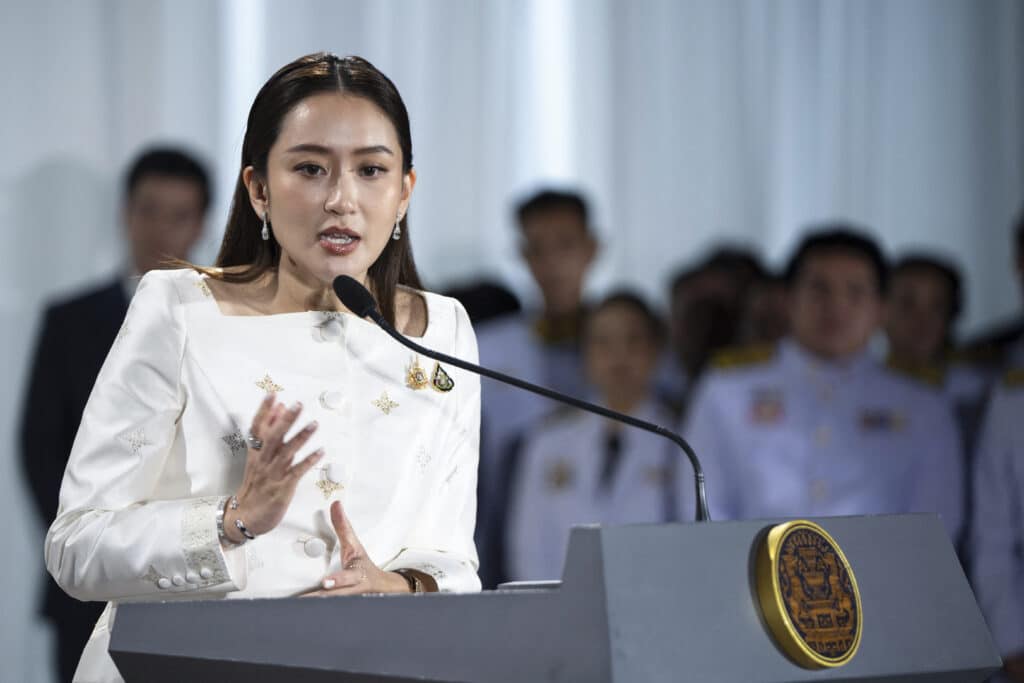
Thai Prime Minister Paetongtarn Shinawatra, known by her nickname “Ung Ing” and daughter of former prime minister Thaksin Shinawatra, speaks during a press conference after the royal endorsement ceremony appointing her as the new Prime Minister of Thailand, in Bangkok on August 18, 2024. (Photo by Chanakarn LAOSARAKHAM / AFP)
Bangkok, Thailand — Thailand’s new Prime Minister Paetongtarn Shinawatra, the daughter of controversial billionaire ex-premier Thaksin, vowed to boost the kingdom’s sluggish economy as she formally took office on Sunday.
Paetongtarn, at 37 the kingdom’s youngest ever PM, comes to power after a court sacked the previous premier and disbanded the main opposition party, throwing Thailand’s ever-febrile political scene into a new round of turmoil.
She is the third Shinawatra to be prime minister, but will hope to avoid the fate of her father and aunt Yingluck, both of whom were thrown out of power in military coups.
READ: Thai king appoints Shinawatra heiress as new prime minister
Paetongtarn accepted King Maha Vajiralongkorn’s official written command to form a government in a ceremony at the headquarters of a former pro-Thaksin TV station on Sunday.
She called on all Thais to work together to help revitalise the country’s economy, which has struggled to bounce back from the Covid-19 pandemic.
“As head of the government I will work with parliament with an open heart, open to all ideas to help develop the country,” she said after the ceremony.
“Fellow Thais, this duty cannot be done by the prime minister alone. I hope I will be able to coordinate the power of all generations, all talented people in Thailand — from the cabinet, the coalition, civil servants, private sector and the people.”
Thaksin, 75, was a prominent attendee at the ceremony, standing alongside Paetongtarn’s husband in the front row.
“She has to work hard. Her strong point is that she is young, she can ask anyone for help — she is humble,” Thaksin told reporters after the ceremony.
“Twenty-three years ago she was standing behind my back but today I was standing behind her.”
READ: Thai ex-PM Thaksin visits hometown for first time since 2006 ouster
Paetongtarn heads a coalition government led by her Pheu Thai party — the latest incarnation of the political movement founded by her father in the early 2000s — but including some pro-military groups long opposed to Thaksin.
Her elevation to the top job came about after the Constitutional Court sacked previous premier Srettha Thavisin on Wednesday for breaching ethics rules by appointing a cabinet minister with a criminal conviction.
Thailand has been dominated for more than 20 years by a tussle for dominance between Thaksin and his allies and the kingdom’s conservative pro-military, pro-royalist elite.
Parties linked to the former telecoms tycoon and one-time Manchester City owner have repeatedly won elections, only to find their governments upended by coups and court rulings.
Paetongtarn is a relative newcomer, running the hotel arm of the family business until late 2022 when she entered politics ahead of last year’s general election — where Pheu Thai was unexpectedly beaten into second place by the upstart progressive Move Forward Party (MFP).
Controversial father
Despite winning most seats in last year’s election, MFP was blocked from forming a government by conservative junta-appointed senators spooked by its promise to reform royal insult laws and break up powerful business monopolies.
That allowed Pheu Thai to strike an uneasy coalition deal with pro-military parties once staunchly opposed to Thaksin and his followers, leading to Srettha’s ascension.
Less than a year later, he became the third prime minister from a Thaksin-backed party to be kicked out by the Constitutional Court.
Paetongtarn will be watched closely for signs of influence exerted by her father, who is the most influential but controversial politician in modern Thai history.
She told reporters at a press conference that she would seek Thaksin’s advice when needed but insisted she was independent of him, with her own ideas and goals.
Asked if he would take an official role as her advisor, Thaksin said: “Not neccessary. I am old. I am 75 years old, she can ask me anything.”
He transformed the kingdom’s politics in the early 2000s with populist policies that won him and his party enduring loyalty from the rural masses — and two election victories.
But that success came at a cost: he was despised by Thailand’s powerful elites and conservative establishment, who saw his rule as corrupt, authoritarian and socially destabilising.
Ousted as prime minister by the army in 2006, Thaksin went into exile two years later but never stopped commenting on national affairs — or meddling in them, according to his critics.
He returned last year on the day Srettha became PM, and was immediately jailed on graft and abuse of office charges dating back to his time in office.
But his eight-year sentence was quickly cut to one year by the king, and he was then soon granted parole because of his age and poor health, and on Saturday he was granted a royal pardon.

